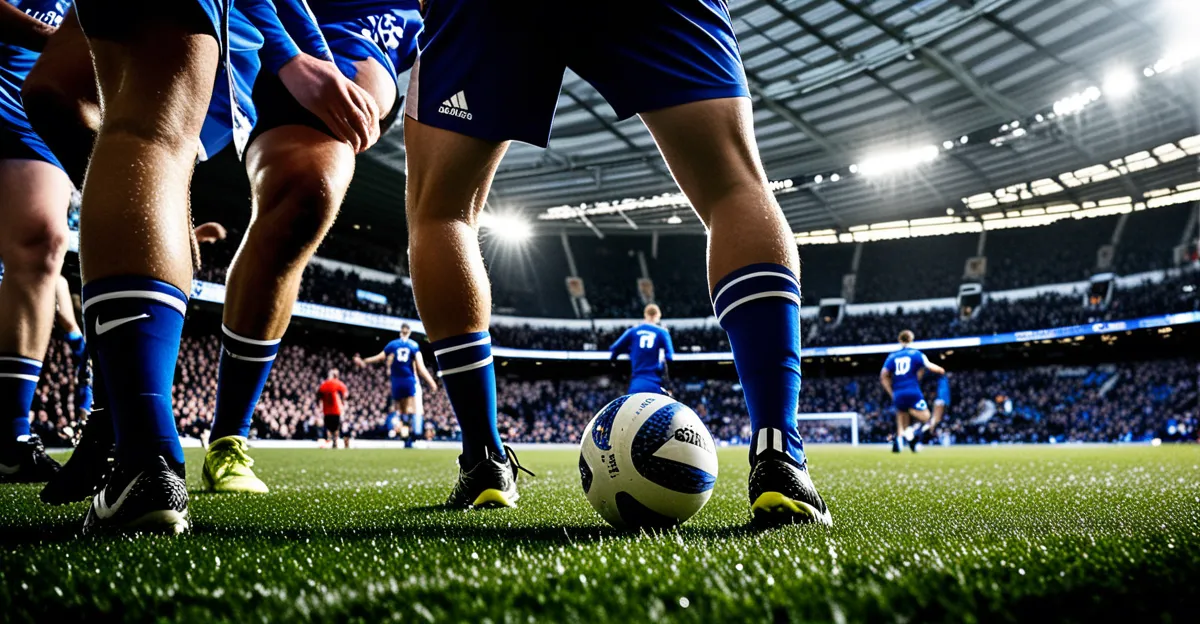Leading Strategies UK Sports Teams Use to Improve Performance
UK sports teams consistently prioritize performance improvement methods rooted in modern, evidence-based approaches. Across football, rugby, and athletics, teams adopt UK sports performance strategies that integrate scientific research and innovative technology to gain competitive advantages. One widespread tactic involves aligning global best practices with UK-specific contexts, tailoring methods to local athletic demands and resources.
A core element of these strategies is embracing multidisciplinary collaboration. Teams often combine expertise from sports science, nutrition, psychology, and technology to enhance every aspect of an athlete’s preparation. This holistic perspective fuels sustainable UK teams’ athletic enhancement, emphasizing long-term health alongside peak performance.
Also to discover : Unleash your outdoor fun with briliantz gel blasters!
Innovation drives many UK teams’ approaches, from utilising cutting-edge training technology to applying rigorous data analytics in monitoring player output. The integration of real-time performance metrics allows coaching staff to make informed decisions on tactics and training load, protecting athletes while elevating their skills. This dynamic, adaptive method represents the future of competitive sport and exemplifies the performance improvement methods advancing UK teams.
In summary, the leading strategies in UK sports hinge on adaptable, science-backed frameworks that embrace innovation and local expertise. By refining these UK sports performance strategies, teams maximize their athletic potential and set new standards for success.
Also to see : What Strategies Do UK Athletes Use to Enhance Their Performance?
Embracing Sports Science and Exercise Physiology
Sports science UK plays a pivotal role in performance improvement methods by providing evidence-based insights that inform training regimes. Through detailed study of biomechanics, physiology, and nutrition, UK teams tailor programs that maximize efficiency and reduce injury risks. Exercise physiology, in particular, underpins many strategies aimed at monitoring athlete fatigue and optimizing recovery. For example, heart rate variability and lactate threshold testing allow coaches to customize load and intensity, ensuring athletes train smartly without overtraining.
Injury prevention and rehabilitation are enhanced by integrating exercise physiology with advanced diagnostics, enabling precise assessments of muscular imbalances and recovery progress. This scientific approach supports UK teams’ athletic enhancement by prolonging athletes’ career longevity and maintaining peak condition.
Collaboration with UK universities and research bodies strengthens these efforts. Partnerships offer access to cutting-edge labs and foster innovation in sport science UK, promoting continuous development of performance improvement methods that reflect the latest findings. These cooperative ventures also facilitate practical translation of research into daily training, enriching athlete preparation with rigorously tested techniques.
The adaptation of sports technology complements exercise physiology, with devices such as GPS trackers and motion capture systems embedded in training environments. This integration facilitates real-time feedback, enabling coaches to monitor biomechanics and physiological responses instantly, refining strategies dynamically. Together, these elements embody a comprehensive, science-driven framework vital to advancing UK sports performance strategies.
Leveraging Data Analytics and Performance Metrics
Data analytics in sport is transforming how UK teams approach performance improvement methods. By harnessing vast amounts of player data, teams gain precise insights into individual and group performance, enabling more informed decision-making. For example, football analytics UK employs real-time performance metrics collected via wearable technology to track players’ speed, heart rate, and positioning during matches. This data helps coaches adjust tactics instantly and manage player workload effectively, reducing injury risk while optimizing output.
Moreover, rugby and cricket teams in the UK integrate similar data analytics in sport to evaluate technique and stamina, tailoring training programs for UK teams’ athletic enhancement. Detailed video analysis combined with statistical performance tracking provides actionable feedback to athletes, fostering continuous improvement. Wearable sensors and GPS devices play a crucial role in collecting precise performance metrics, allowing for micro-level assessments and long-term performance trends identification.
In addition, advanced software tools analyze opponents’ strategies using aggregated data, supporting tactical planning unique to each sport’s demands. This comprehensive application of data analytics exemplifies how UK sports performance strategies leverage technology and information to drive competitive advantage and elevate athletic standards.
Advancing Coaching Methods and Skill Development
Coaching innovation is central to enhancing UK sports performance strategies, moving beyond traditional approaches to incorporate evidence-based and athlete-centred models. Elite coaching UK focuses on integrating progressive methodologies such as periodised training cycles and individualized skill development programs tailored to specific athlete needs and sport demands.
Customised skill training enables coaches to address both technical and tactical components with precision. For instance, video analysis combined with detailed performance metrics allows continuous feedback, identifying strengths and weaknesses to refine techniques efficiently. This approach supports UK teams’ athletic enhancement by fostering consistent improvement and adaptability in competition.
Furthermore, the integration of performance reviews encourages a reflective process for athletes and coaches alike. By systematically analyzing training outcomes and match performances, coaching staff can adjust plans dynamically, ensuring that development remains aligned with evolving goals. These performance improvement methods represent the cutting edge in coaching practices within UK sports, emphasizing the synergy between technology and human expertise to maximize athlete potential.
Optimising Nutrition and Recovery Practices
Personalised sports nutrition UK plans form a core part of performance improvement methods, as tailoring diets to individual athlete needs enhances energy efficiency and supports training demands. These high-performance diet plans consider factors such as sport-specific metabolic requirements, training load, and recovery phases, ensuring athletes receive optimal macronutrient and micronutrient balance. For example, endurance athletes may prioritise carbohydrate periodization, while strength-focused individuals adjust protein intake accordingly.
Athlete recovery is equally vital, employing diverse modalities that complement nutritional strategies. Techniques such as cryotherapy, physiotherapy, and sleep management are integrated into UK teams’ athletic enhancement programs to accelerate muscle repair and reduce inflammation. Sleep tracking technologies provide actionable insights, allowing fine-tuning of recovery schedules to individual rhythms, which fosters peak readiness for competition.
Collaboration with UK-based sports nutritionists and dietitians further strengthens these approaches. Their expertise ensures that nutrition and recovery practices remain evidence-based and adaptive to the latest research findings. This professional guidance enhances the effectiveness of sports nutrition UK initiatives within performance improvement methods and underpins sustained athletic development.
Incorporating Psychological Training and Team Cohesion
Psychological training is a vital pillar within UK sports performance strategies, focusing on enhancing mental resilience and concentration. Sports psychology UK employs tailored mental conditioning techniques that help athletes maintain focus under pressure and recover quickly from setbacks. This mental fortitude is essential for sustaining peak performance and managing the psychological demands of elite competition.
Team cohesion strategies complement mental resilience by fostering strong interpersonal relationships and collective trust within squads. UK teams prioritize leadership development and communication skills to build harmonious environments where athletes support each other’s growth. This social dynamic encourages coordinated effort during competition, enhancing overall UK teams’ athletic enhancement by translating individual mental strength into collective success.
Furthermore, the integration of psychological support systems ensures ongoing mental health management. Expert sports psychologists work closely with teams to provide counseling and stress-management tools, creating a comprehensive framework within performance improvement methods. This approach not only improves athletes’ emotional well-being but also underpins consistent performance, especially during critical phases like tournaments or injury recovery.
By embedding mental resilience training, fostering team cohesion, and offering professional psychological support, UK teams effectively address both individual and group psychological needs. This holistic strategy is increasingly recognized as indispensable in achieving and sustaining high-level sporting success.
Integrating Cutting-edge Technology in Training
The adoption of sports tech UK innovations is transforming the training landscape for UK teams’ athletic enhancement. Modern training technology delivers precise monitoring and feedback, allowing athletes and coaches to push performance boundaries safely and efficiently. Key to these advances are comprehensive video analysis platforms and AI-driven assessments, which dissect technical execution and physiological responses with extraordinary detail. This technology empowers coaches to identify subtle biomechanical inefficiencies and tailor individualized training adjustments.
Virtual and augmented reality training tools are another frontier in performance improvement methods. These immersive technologies simulate realistic game scenarios, enabling athletes to develop decision-making skills and spatial awareness without physical fatigue or injury risk. Their application enhances cognitive as well as physical preparation, a crucial benefit amid demanding competitive schedules.
Partnerships with UK startups and research labs accelerate innovation by blending academic expertise with practical sports demands. These collaborations foster the creation and rapid implementation of novel sports tech UK solutions, such as wearable sensor arrays and smart equipment. This ecosystem ensures that UK sports performance strategies remain at the cutting edge, supporting continuous athlete development through technology-driven insights.
Collectively, these technological integrations represent a catalyst for elevated training effectiveness. By embracing advanced tools alongside traditional coaching, UK teams optimize preparation processes, ultimately translating into superior performance on the field.
Leading Strategies UK Sports Teams Use to Improve Performance
UK sports teams adopt a combination of performance improvement methods that are deeply rooted in evidence-based research and cutting-edge innovation. Central to these strategies is the integration of global best practices adapted specifically for the UK’s unique sporting environment, ensuring relevance to local conditions, athlete profiles, and resource availability. This localisation means that while teams draw on international standards, they fine-tune approaches to optimise outcomes within UK contexts.
A hallmark of these UK sports performance strategies is their multidisciplinary nature. They blend expertise across sports science, technology, coaching, and psychology to create comprehensive athlete development frameworks. This cohesive approach supports sustainable progress, balancing short-term competitive peaks with long-term athlete health and resilience. By continuously evolving through scientific validation and technology adoption, UK teams maintain a dynamic edge.
Innovation also drives these strategies forward. From real-time data collection and analysis to sophisticated training tools, technology enables precise monitoring and personalization. Coaches and sports scientists collaborate closely, leveraging insights to adjust training loads, enhance skills, and prevent injuries. These iterative improvements embody the core of UK teams’ athletic enhancement, fostering an environment where science and practice unite to elevate competitive performance consistently.
Leading Strategies UK Sports Teams Use to Improve Performance
UK sports teams adopt performance improvement methods that blend evidence-based research with innovation, ensuring relevance within the country’s unique sporting landscape. Central to these approaches is adapting global best practices specifically for UK conditions, allowing teams to tailor techniques according to local athlete profiles, facilities, and competition demands. This localisation strengthens the effectiveness of UK sports performance strategies by aligning them with native contexts rather than relying on one-size-fits-all models.
A key feature of these strategies is their comprehensive integration across multiple disciplines. By combining expertise in physiology, psychology, coaching, and technology, teams create a holistic framework aimed at sustained UK teams’ athletic enhancement. This integration supports continuous refinement through feedback loops informed by scientific data and practical insights, fostering athletes’ physical and mental resilience alongside skill development.
Furthermore, innovation drives these leading strategies forward. The utilisation of advanced data analytics, wearable sensors, and AI-assisted tools helps coaches make precise adjustments to training loads and competition tactics. Real-time monitoring and personalized interventions reduce injury risks while pushing performance boundaries. Together, these facets exemplify how performance improvement methods are evolving within the UK, with a focus on both maximizing current potential and future-proofing athlete careers.









